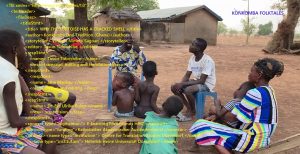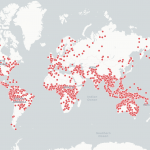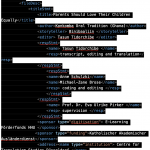Our session on the 11th of January was our first session after the holidays. We had time until the 7th to finish our group work and had to upload our edited and subtitled videos until then. This session was held … Continue reading
Category Archives: Student Entries
How to automatically add subtitles in DaVinci Resolve – An easy 10 step guide
This gallery contains 25 photos.
Did you know that there is an easy way to automatically add subtitles in DaVinci Resolve? This is a simple tutorial that will save you a lot of time and energy when editing your videos. You will need: Step 1Open … Continue reading
Some Insights into Konkomba Folktale
My learning experience This semester, I have had the incredible opportunity to be immersed in the captivating world of Konkomba folktales. For most of us in class it was also the first time being confronted with coding a text as … Continue reading
Folktales and language. Why the Wasp Has a Tiny Waist
This gallery contains 5 photos.
After many hours spend working with Visual Studio Code, I was happy to return to learning more about the cultural aspects of folktales. In this blogpost, I want to highlight how folktales help convey cultural and linguistic attributes by working … Continue reading
The Konkomba folktale’s performance aesthetics
The performance of the Konkomba folktale adheres to traditions and standards which may vary slightly from story teller to story teller but make the performances recognisable as belonging together. The Konkomba folktales are stories which blend the genres of prose, … Continue reading
(Not really) Mastering TEI and XML, a rudimental tutorial
This gallery contains 2 photos.
This post will hopefully help you to get a general understanding of what coding a TEI file in XML language is and what it’s good for. Please note that I am definitely not an expert on this topic, and I … Continue reading
Searching for non existent errors
This gallery contains 1 photo.
Searching for nonexistent Errors The task is fun Should be easily done Fifteen mistakes Waiting to be found Happy to partake I start this round. …….. Going through every line This header looks fine. Searching for errors In this faulty … Continue reading
Coding for <term ref=gloss1> blutige Anfänger </term>
This gallery contains 8 photos.
<TEI xmlns=”http://www.tei-c.org/ns/1.0″> <teiHeader> <fileDesc> <titleStmt> <title> Coding for <term ref=gloss1> blutige Anfänger </term> </title> <author> Jule Wolters </author> >/titleStmt> </teiHeader> <text> <body> <div type=”introduction”> <head type=”subTitle”> Introduction</head> <p> Hello everyone! Welcome to my blog entry about our second Coding lesson … Continue reading
Discovering the world of TEI & XML: My first university lesson!
Hey everyone! I just attended my first university lesson on TEI & XML and I must say, it’s not just about codes and brackets. It’s like unveiling a secret language behind digital humanities! Let’s dive in. So, what’s the difference … Continue reading
Let us tell stories. Konkomba folktale performance aesthetics
by Lara Wenisch In our second session of this seminar, we learned about the Konkomba people, their story telling and performance tradition. For me it was the first time to hear and see a Konkomba folktale performed and I was … Continue reading






